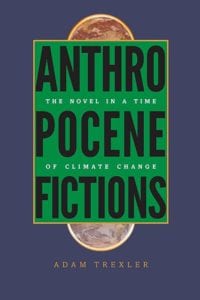
University of Virgina Presshttp://upress.virginia.edu
Although Michael Crichton’s State of Fear is neither high literature nor scientifically accurate, it may well be the most important climate change novel yet written. Driven by Crichton’s reputation as the author of Jurassic Park and creator of the television show ER, over 1.5 million copies were printed in the United States alone, making it the most popular climate change novel to date. The novel is unapologetically polemical, weaving the set pieces of a thriller with arguments among Evans, a young lawyer with environmental sympathies, Nicholas Drake, an environmental campaigner secretly funding an ecoterrorist organization, and John Kenner, an MIT professor and federal agent trying to prevent Drake’s artificial disasters. Despite this controversy, the novel captured the imagination of US senator James M. Inhofe, an Oklahoma Republican who had previously declared global warming “the greatest hoax ever perpetrated on the American people.” Inhofe made State of Fear required reading for the Committee on Environment and Public Works and then Crichton to testify before it, to the scorn of the committee’s Democratic members. If it seems strange that Inhofe invoked a novel to support his arguments, the novel seemed to encourage a factual reading: Kenner’s arguments are backed up with footnotes apparently proving anthropogenic global warming isn’t happening.
Critics focused on the novel’s footnotes, leading to mixed reviews. Some critics were dismayed to find their thriller slowed down by “facts” and found the arguments silly and “ill-digested,” but most reviews declined to comment on the novel’s factuality. Scientific reviewers were less charitable. They interpreted the novel as an attack on scientific authority and counterattacked it as a factual argument. In a review in Nature, Myles Allen read the novel as an argument that scientists were collaborating with the environmental movement by bending and inventing facts. His counterattack focused on the footnotes and appendices, which were “clearly intended to give an impression of scientific authority,” and found the novel’s arguments depended on cherry-picked data, straightforward scientific errors, and illogic. State of Fear undermined the legitimacy of scientific review and reduced climate change to “a matter of political taste,” rather than a difference between good and bad science. Prominent scientists weighed in to dispute the novel’s account of their data. Scientists were within their rights to dispute Crichton’s misrepresentation, but they badly misread Crichton’s investments toward science. In public speeches before the release of the novel, Crichton defended a realist account of science, which should be a search for objective facts, and he inveighed against postmodern relativism, which claimed science was “just another form of raw power.” Even so, the debate around climate change, with its dependence on scientific consensus rather than verifiable data, suggested postmodernists might be right. Crichton’s simultaneous belief in scientific realism and skepticism about climate change made for a difficult argument: a critique of climatology would seem to undermine the scientific realism he would defend. Instead of writing a novel with a realist or postmodernist sense of science, Crichton constructed a thriller in which both sensibilities operate at the same time. As we will see, their coexistence suggests they are not the polar opposites contemporary criticism (and Crichton) assumed.
—Adam Trexler
From Anthropocene Fictions: The Novel in a Time of Climate Change by Adam Trexler, University of Virginia Press, upress.virginia.edu. Reprinted with permission. All rights reserved.
